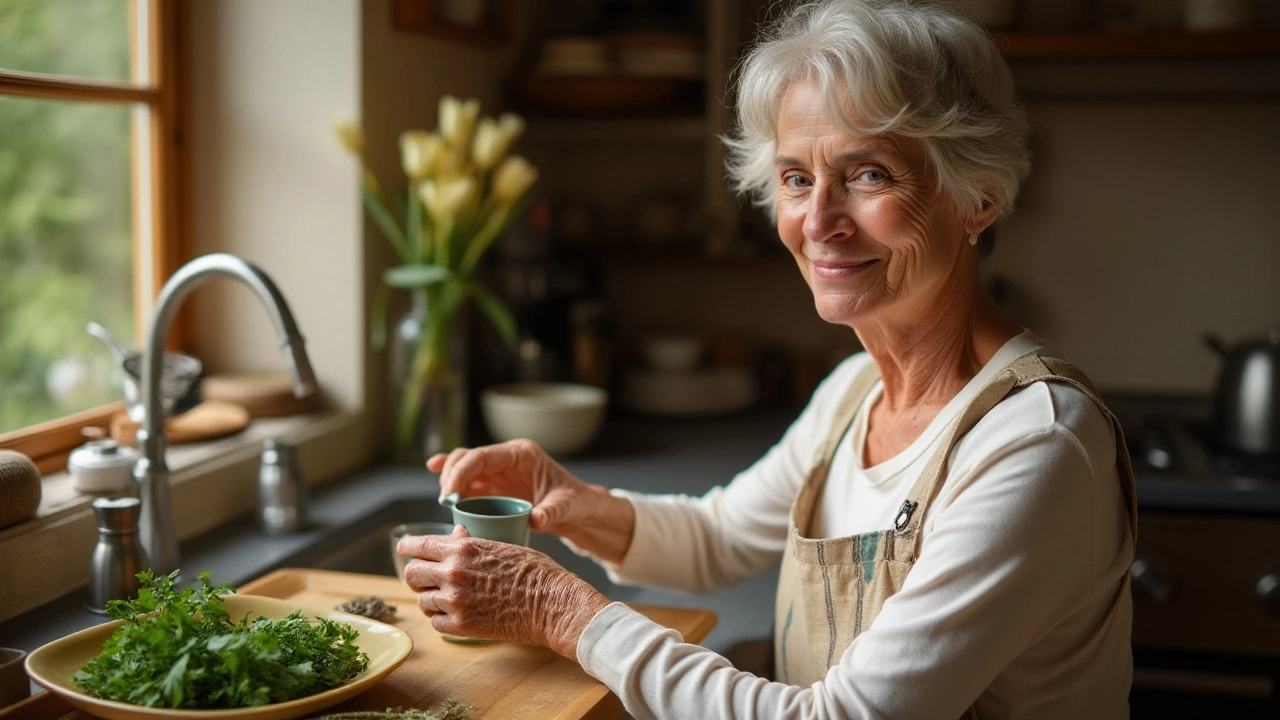Wrinkles, those telltale lines that map the journey of our lives, often become a source of frustration for many seeking to maintain youthful skin. Yet, maintaining smooth and vibrant skin doesn't have to be a complex endeavor reserved for the wealthy or beauty-obsessed. Often, it's the simplest methods that bring about the most noticeable changes.
In this article, we will delve into an array of easy, natural techniques that anyone can incorporate into their daily routine. From tweaking daily habits to integrating nourishing foods into your diet, each step we'll discuss aims to help diminish the appearance of wrinkles, making your skin feel fresher and look younger over time.
Set aside the serums and ointments for a moment, and consider how a few minor adjustments can yield major results in your skincare routine. Ready to discover how you can refresh your face without breaking the bank or undergoing drastic procedures? Let's embark on this journey together.
- Understanding Wrinkle Formation
- Lifestyle Changes for Wrinkle Reduction
- Skincare Routines That Work
- Nutritional Tips for Healthier Skin
- Natural Remedies to Try
- Long-term Effects and Maintenance
Understanding Wrinkle Formation
Wrinkles, those persistent lines and folds that we see gazing back at us in the mirror, have more layers than we might think—both metaphorically and literally. At a fundamental level, wrinkles are the product of a combination of factors, most prominently the decline in collagen and elastin in our skin. These two proteins maintain the skin's structure and elasticity. As we age, our body produces less of them, and external stressors like sun exposure and pollution exacerbate this decline. When our skin loses these crucial elements, it begins to sag and gather into wrinkles that signify years gone by.
Interestingly, aside from natural aging, our facial expressions play a significant role in wrinkle development. Every time we smile, frown, or squint, our skin creases to accommodate the motion. As time passes, these creases become more permanent features on our faces. This is not to say we should avoid smiling—far from it! But it's an intriguing insight into how our bodies reflect our lives' emotional landscapes. For instance, the lines of worry may manifest as a furrowed brow, while crow's feet could be seen as remnants of countless joyous moments under the sun.
Direct sunlight and its powerful ultraviolet (UV) rays are also substantial contributors to premature wrinkles. Often termed 'photoaging,' this damage results in the breakdown of essential skin components faster than biological aging would cause. While sun exposure is crucial for vitamin D synthesis, overexposure without protection can have the reverse effect on our skin health. An interesting statistic from the Skin Cancer Foundation reveals that up to 90% of visible skin changes attributed to aging are actually caused by the sun. This underscores the importance of integrating sun protection into our daily routines, irrespective of age or skin type.
Moreover, lifestyle choices such as smoking and diet have a profound impact on skin health. Smoking introduces a myriad of chemicals into the body that accelerate the aging process by reducing blood flow to the skin, thereby depriving it of oxygen and essential nutrients. Meanwhile, a diet lacking in nutrients can further strip the skin of its vibrancy, making it more susceptible to damage. Fatty acids found in fish and antioxidants in fruits and vegetables can aid in preserving youthful skin. It's also crucial to stay hydrated, as water contributes significantly to keeping the skin plump and resilient, reducing the appearance of existing wrinkles.
"Wrinkles should merely indicate where smiles have been," wrote the great Mark Twain. This quote beautifully encapsulates the notion that while wrinkles can be a source of vexation, they also tell a story—our story laden with experiences, emotions, and time.
Understanding the multifaceted nature of wrinkle formation empowers us to address them more effectively, adopting strategies that protect and sustain our skin's health holistically. Whether by donning a hat under the sun or investing in the right skincare products replete with collagen-boosting ingredients, being proactive is key. Wrinkle formation is inevitable, but how we respond to these natural changes makes all the difference in how prominently they appear and how we feel about them.
Lifestyle Changes for Wrinkle Reduction
The journey to achieving smoother, more youthful-looking skin often begins with simple lifestyle adjustments. While genetics play a role, much of what determines our skin's appearance can be directly linked to our everyday habits. By making a conscientious effort to address these factors, you can noticeably reduce wrinkles and maintain a resilient complexion. Our daily routines often involve stress, exposure to harmful environmental elements, and neglect of essential health practices, each contributing in subtle but impactful ways to the development of wrinkles. Let's explore how mindful choices can turn back the signs of aging.
First, consider your relationship with the sun. Ultraviolet (UV) rays are a notorious cause of premature skin aging. Regular use of broad-spectrum sunscreen not only protects against immediate damage like sunburn but also minimizes longer-term skin damage which can lead to wrinkles. It's crucial to remember that UV exposure occurs year-round, not just during sunny months. This protection extends beyond creams; clothing, hats, and seeking shade are invaluable. According to the Skin Cancer Foundation, diligent sun safety can reduce the risk of skin aging by approximately 24%.
Additionally, hydration is a key factor that is often overlooked. Drinking adequate water daily keeps the skin plump and aids in flushing out toxins. Dehydrated skin tends to look more wrinkled and sallow. Complementing water intake with a balanced diet rich in antioxidants helps combat oxidative stress, a known contributor to cellular aging. Include plenty of colorful vegetables like carrots and spinach, rich in beta-carotene and lutein, to your meals. These can not only fight off environmental damage but also boost collagen production, essential for maintaining skin's elasticity.
Stress management is another powerful tool in the fight against wrinkles. Chronic stress triggers the body to release cortisol, a hormone that breaks down skin collagen, leading to premature aging signs. Techniques such as meditation, yoga, and even moderate exercise can help in reducing stress levels. Engaging in these activities has been shown in studies to promote better sleep, retreating lines caused by drooping and fatigue.
"One cannot underestimate the impact of stress reduction on skin health," notes Dr. Andrew Weil, a pioneer in integrative medicine. "Adopting regular relaxation practices supports better skin appearance and overall well-being."
Lastly, avoiding smoking and moderating alcohol intake can have substantial benefits. Nicotine constricts blood vessels, impairing blood flow and depriving the skin of oxygen and essential nutrients. This process accelerates the breakdown of skin elasticity. Alcohol, while it may seem to provide temporary relaxation, dehydrates the body and skin, making existing lines more pronounced. Consider swapping cigarettes for healthier habits and reducing alcohol to see visible skin improvements over time.
With patience and commitment, these lifestyle changes can significantly bolster your skin's defense against time and nurture a naturally youthful glow. Integrating these practices into everyday life not only helps in reducing wrinkles but also contributes to your physical and mental health, resulting in a more radiant you.

Skincare Routines That Work
When it comes to effective skincare routines, the first step is understanding the unique needs of your skin. The key lies in consistency coupled with the right products designed for your skin type. Whether you are managing oily skin, dryness, or a combination, having a tailor-made regime is crucial. Begin with a gentle cleanser, ideally one without harsh sulfates, to keep your skin’s natural oils intact while removing impurities. Over-washing, contrary to popular belief, can exacerbate issues like dryness and irritation, so it's important to cleanse effectively yet gently.
Once your face is clean, the next step involves using a toner or essence to balance your skin’s pH and prepare it for the absorption of nourishing products you've chosen. Many toners today are infused with ingredients like hyaluronic acid or rose water, which not only help in maintaining moisture but also emanate a refreshing scent that can enhance your skincare ritual. Remember, moderation is key, as over-applying can lead to product buildup and clogged pores. Known in skincare circles as "the Korean method," applying multiple thin layers can sometimes be more beneficial than slathering on one thick application.
Including targeted treatments such as serums loaded with vitamin C, retinoids, or peptides can significantly improve the appearance of wrinkles and fine lines with regular use. Studies highlight that consistent use of retinoids can lead to smoother, more radiant skin. A 2019 study published in the Journal of Clinical and Aesthetic Dermatology emphasized the prowess of retinol in reducing signs of aging over a prolonged period. As Dr. Lisa Zaiser, a dermatologist known for her work on anti-aging, points out in her guide on skin resilience, “Retinoids improve the collagen content of the skin and enhance its firmness.”
"Retinoids improve the collagen content of the skin and enhance its firmness." – Dr. Lisa Zaiser
Following your treatment products, a lightweight moisturizer helps to lock in those active ingredients while keeping your skin barrier healthy and hydrated. Those dealing with excessive dryness might find night creams or sleeping masks beneficial as they provide intense hydration. In contrast, lighter gels often suit oily skin types, offering moisture without a greasy feel. Incorporating SPF during the day remains non-negotiable, as unprotected sun exposure accelerates aging and the formation of wrinkles.
Finally, regular, and not overly aggressive, exfoliation plays a pivotal role in unclogging pores and removing dead skin cells, promoting a glowing and youthful complexion in the process. Using a gentle exfoliant two to three times a week can enhance your skin's natural renewal process, keeping it smooth and even-toned. Microfiber cloths or products containing lactic acid serve as good options for those wary of mechanical scrubbing, ensuring a refined texture without irritating the skin layer. Maintaining healthy skin is truly a balance of diligent care and respecting your skin's natural responses to products and environment.
By understanding these skincare fundamentals, you're laying down a pathway toward not only reducing existing signs of aging but also preventing future lines and wrinkles from taking shape. Skincare isn't merely a chore; it's a moment of mindfulness catered towards enhancing your radiance.
Nutritional Tips for Healthier Skin
Our skin is often a reflection of what we eat. The phrase 'you are what you eat' holds profound truth, especially when it comes to maintaining vibrant, youthful skin. If you aim to tackle wrinkles and enhance your skin's resilience, a diet rich in certain nutrients is crucial. Incorporating foods high in vitamins such as vitamin C, vitamin E, and biotin can significantly alter the skin's appearance, making it look refreshed and smoother. Citrus fruits, berries, and green leafy vegetables provide essential vitamin C, which helps in collagen production, a protein that keeps skin firm and young-looking. Avocados and almonds, on the other hand, offer good amounts of vitamin E, which protects the skin from oxidative stress, a key contributor to the aging process.
Omega-3 fatty acids play a pivotal role in skin health. Found in abundance in fatty fish like salmon and mackerel, as well as flaxseeds and walnuts, these healthy fats help maintain the skin’s lipid barrier and lock in moisture. This results in plumper skin and reduced appearance of fine lines. Adding a weekly serving of omega-rich foods can not only benefit your heart but also improve your skin's overall texture and glow. Hydration is equally paramount; water-rich foods like cucumbers, watermelon, and tomatoes are perfect as they hydrate and supply antioxidants, combating the aging effects of free radicals.
Skincare isn't just about topical treatments; it starts inside. Studies show that people who consume antioxidant-rich foods tend to have fewer wrinkles. Antioxidants neutralize free radicals, which cause oxidative stress leading to premature aging. Additionally, beta-carotene found in carrots and sweet potatoes converts to vitamin A in the body, an essential component that aids in skin cell regeneration. Quoting a renowned dermatologist, "What you put inside your body reflects on the outside," underscores the symbiotic relationship between diet and skin health.
Consider incorporating certain spices such as turmeric and ginger, both known for their anti-inflammatory properties. These spices not merely add flavor to your meals but also help reduce inflammation at the cellular level, which in turn can diminish the early signs of aging. A sprinkle of these pantry staples on a vibrant salad or a warm stew can have transformative health effects. It's fascinating to note how simple swaps in our daily meals can have lasting impacts on the skin, making your efforts to reduce wrinkles both delicious and effective.
A balanced diet for wrinkle reduction might look daunting at first, but with simple strategies, it can be quite achievable. Here’s an ultra-easy meal plan idea that’s both skin-friendly and delightfully tasty:
- Start your day with a fruit smoothie packed with spinach, banana, and a handful of nuts.
- For lunch, enjoy a quinoa salad with avocado, cherry tomatoes, and a lemon-turmeric dressing.
- Dinner could be grilled salmon accompanied by steamed broccoli and sweet potato wedges.
- Snack on a bowl of mixed berries or carrot sticks with hummus.
Incorporating these small and thoughtful dietary changes is often all it takes to start seeing a real difference in your skin. Remember, effective skincare begins on your plate, and by nourishing your skin from the inside, you're likely to experience a radiant, youthful complexion that's resilient to the passage of time.

Natural Remedies to Try
When it comes to addressing wrinkles and maintaining a youthful complexion, embracing natural remedies offers an appealing alternative to those seeking gentle and cost-effective beauty solutions. These age-defying techniques rely on everyday ingredients and holistic approaches that many often overlook, yet they boast impressive results rooted in both tradition and science.
One fantastic and often underestimated tool against wrinkles is the power of hydration. Proper moisturizing affects skin elasticity significantly. Applying coconut oil, for example, serves as a natural moisturizer, rich in antioxidants that fend off skin damage from the sun and pollution, common culprits of premature aging. Its application before bedtime can facilitate overnight healing and restoration. Similarly, aloe vera, a timeless remedy, is celebrated for its hydrating capabilities. Research suggests that regular use noticeably improves skin elasticity, making it a delightful addition to your anti-aging arsenal.
According to the American Academy of Dermatology, "Keeping your skin well-hydrated can help diminish the appearance of fine lines by plumping the skin."
Beyond oils and gels, dietary choices also play a pivotal role. Omega-3 fatty acids, abundantly found in flaxseeds and fish oil, encourage skin suppleness and reduce inflammation, a key factor in preventing and reducing fine lines. Incorporating foods like these into your diet can act as an internal shield against the aging process. To further enrich your skin from the inside, consider antioxidants like vitamin C-rich fruits and vegetables, such as oranges and bell peppers. These help in collagen production, which is essential for healthy, youthful skin.
Homemade Facial Masks
Creating homemade masks from natural ingredients like banana, yogurt, and avocado can offer a refreshing treat for your skin. Bananas are loaded with vitamins A and E, which promote skin rejuvenation. A simple homemade mask can be made by mashing a ripe banana and mixing it with a teaspoon of honey for an added antioxidant boost. Apply this mixture to your face for 15-20 minutes before rinsing off with warm water. This routine, when practiced weekly, can soften rough skin and improve texture.
Another secret weapon against the signs of aging is green tea. Known for its high antioxidant content, green tea applied as a facial rinse or even as a component in DIY face masks, can help to repair sun-damaged skin and stave off wrinkles. Boil a couple of tea bags and, after letting the concoction cool, splash it on your face or dip a cotton ball to gently apply it, providing you with a natural tonic for revitalizing your skin's resilience.
The beauty of natural remedies lies in their accessibility and simplicity. By incorporating these methods into your routine, you're committing to a lifestyle that not only reduces wrinkles but also embraces a holistic path to overall wellness and beauty.
| Natural Ingredient | Benefit |
|---|---|
| Coconut Oil | Moisturizes and repairs skin. |
| Aloe Vera | Improves elasticity. |
| Omega-3 Fatty Acids | Increases skin suppleness. |
| Green Tea | Repairs and protects skin cells. |
Long-term Effects and Maintenance
When embarking on the journey to mitigate wrinkles, patience and persistence are your best allies. Achieving a smoother complexion isn't a sprint; it's more like a marathon where steady progress leads to lasting results. It's crucial to understand the benefits of different practices, allowing time for these methods to work their magic. Over months and even years, maintaining a holistic skincare approach can noticeably soften fine lines and enhance your skin's overall vitality.
The long-term effects of a well-curated skincare regimen reveal themselves gradually. Consistency yields significant benefits, such as increased elasticity, a more even skin tone, and a radiant, youthful appearance. One of the essential factors is the daily use of sunscreen. This single practice helps prevent new wrinkles from forming by protecting against UVA and UVB rays, which are notorious for accelerating aging. It's worth noting that incorporating a diet rich in antioxidants plays a dual role, providing internal support alongside topical treatments. Foods like berries, nuts, and leafy greens contribute to reducing oxidative stress, a key player in skin aging.
For those serious about maintaining their results, understanding what's working and what's not is vital. Facial treatments are an excellent way to actively tackle these changes, and regular check-ins with a dermatologist can ensure your efforts are on track. As the skin renews itself approximately every 28 days, tweak your routine with the seasons and as your skin changes. According to renowned dermatologist Dr. Susan Taylor, "The skin is an active organ. It’s responsive to both good and bad habits, and effective maintenance requires us to be mindful of that."
Remember, any successful skincare journey requires personalized attention. Not every solution works for every skin type, and sometimes experimenting is necessary to find the products and routines that yield the best results for you. For instance, some might find retinoids beneficial, while others may prefer peptides for their anti-aging effects. When new products are introduced, a patch test can help avoid unwanted reactions.
Maintaining youthful skin is also about adopting a mindful lifestyle. Quality sleep, staying hydrated, and managing stress can dramatically impact your skin's health. These aspects are often underestimated but are essential pillars of preserving your skin's natural glow. A balanced lifestyle, accompanied by targeted skincare, works synergistically, providing the necessary foundation for anti-aging success over time.
To track your progress effectively, consider keeping a skincare journal. Log entries with what you used and observed can paint a clear picture of what’s working for your skin. Over time, this helps optimize your routine and avoid setbacks in your anti-wrinkle strategy. With commitment and the right approach, fear not the passing years; instead, embrace them with confidence in your vibrant, healthy-looking skin.


